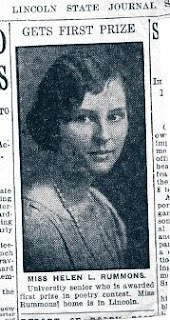Helen Schaible was a poet, mother, teacher, classicist. The Helen Schaible International Sonnet Contest was established in her memory in 1998 by the P
Submit To 2023 Helen Schaible International Sonnet Contest
Opens July 15!
Helen Schaible was a poet, mother, teacher, classicist. The Helen Schaible International Sonnet Contest was established in her memory in 1998 by the Poets Club of Chicago and funded by a gift from Helen's daughters Jane Edwards, Lucy Parker, and Katherine Martin, and her son, the late David Schaible.
Contest Rules & Submission Period
Submission Period: June 1 – July 15, 2023. Free and open to all!
Categories
#1 - Traditional Sonnet (Shakespearean or Petrarchan)
#2 - Modern Sonnet (See below for a definition and guidelines.)
Enter ONLY ONE poem in either Category #1 or #2, or one poem in each. (This means just 1 or 2 poems total per poet.
If any poet enters more than one poem in a category, the contest coordinator will automatically accept only the first one.)
Entries must be original and unpublished.
Poets can only win or be noted in one category.
Also Read
Prizes for both categories:
First Prize: $50. Second Prize: $30. Third Prize: $20.
Three Honorable Mentions and three Special Merits will be named per category, ranked.
Winners will be notified by mid-September, 2023, and receive certificates of achievement.
A list of all 18 winners’ names and poem titles will be posted on our website. All will be invited to participate in an online reading in October.
ELECTRONIC ENTRIES ONLY.
To enter: Send one email to the following address, using the words “Sonnet Contest” and your last name in the subject line.
In the body of your email, include your name, address, and phone number. (Entries sent without the required information will not be accepted.)
Then list the title(s) of your sonnet(s), noting if each is traditional or modern. Finally, attach each sonnet separately to the email as a Word doc, using “traditional” or “modern” as the name for each. On each poem attached, note the category in the upper right corner.
DO NOT put your name or any other identification on the poems. Send by midnight CDT, July 15, 2023, to contest chair Kate Hutchinson at kate28.hutchinson@gmail.com. Email Kate if you have any questions.
No late entries or paper (snail-mail) entries will be accepted.
A note about judging: All judging of poems is done anonymously, with no input from anyone associated with Chicagoland Poets & Patrons. All judges’ decisions are final.
2023 Traditional Sonnet Judge
Brian Palmer
Brian Palmer was raised in the Midwest and has since lived a large portion of his life in Colorado with several intervening years in the Pacific Northwest. He currently lives in Juneau, Alaska.
He earned a degree in English/Literature at Colorado State University and his MFA at Western Colorado University. After a fulfilling career as a high school English teacher and theater director, he now pursues his interests in reading, studying, and writing poetry, and publishing his work in various journals in the US and in the UK. His chapbook Prairiehead will be released in the fall of 2023.
He is the editor of THINK: A Journal of Poetry, Fiction, and Essays.
Beth Staas
Beth Staas has been published in several national periodicals and on numerous websites. Her poetry has won or placed in many contests and been published in North American Review, Art Times, Combat, Iconoclast, Encore, The Lyric and Prairie Light Review. Credentials include a bachelor's degree in psychology and a master's in English. She taught writing at the high school and college level for more than twenty years and was listed in Who’s Who among American Teachers.
A member of Chicago Poets and Illinois State Poetry Society, the sonnet in all its forms is her favorite. Visit her website www.bethstaas.com for new poems, stories, and writing tips.
Some Thoughts on Defining a Modern Sonnet:
Modern sonnets are poems that violate one or more of the rules of traditional sonnets, but still contain what the Poetry Foundation website refers to as a “ghost” of the sonnet form. They may or may not be rhymed, and they may experiment with various meters or not use a regular meter at all. Usually they are fourteen lines, but this may also vary slightly. Rules about subject matter are looser than in the more traditional sonnets, though they should offer some sort of final point or insight in the closing lines.

_20250410_083915_0000.jpg)






%20(1).jpeg)



.png)

%20(3).jpeg)
COMMENTS